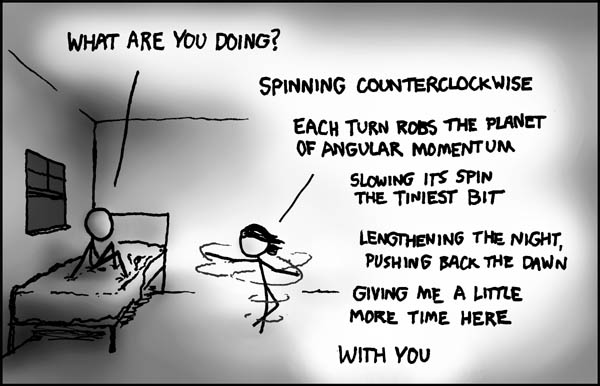Ed's thesis work is basically (in my highly generalized understanding) about how to make computers or other devices in a network communicate with each other peer-to-peer if each knows its own location but not necessarily the location of every other one. When he was explaining it to me, I used the goofy analogy of an array of penguins, each drifting around on its own ice floe with a walkie-talkie. If Flippy wants to get a message to Pete, he broadcasts on the channel that any other penguin within range can receive. With his message, he sends his own location. Somehow, given this information, each penguin that receives the message decides whether to pass it on or let someone else handle it. They don't know where Pete is, but only the path the message has followed so far. Somehow given their own location, and Flippy's location, they can figure out how to route the message so that it eventually reaches Pete.
Ed is doing this with some version of the right-hand rule for navigating mazes. This rule (which doesn't work in all cases) says that you can navigate a maze by always cleaving to the right-hand wall. Once you reach a dead end, of course, the old left-hand wall is the right-hand wall, so for many maze configurations, this will eventually result in a full traversal of the maze.
Anyway, Ed was stuck at some point, so I suggested he explain his problem to me. Many people find that explaining a conceptual problem to someone (even if the "someone" is a dog or other noncomprehending beast, which I expected to be) can give them some insight into solving it.
"Do you prefer lined or unlined paper?" I asked. Unlined (score!) ".5 or .7?" He knew I meant lead size (of course) and he had a strong preference. God I love us geeks.
So he explained the above to me, with some sketches, and started telling me about his problem, which was kind of a vector calculus one. (At least, it was material I learned in vector calc that enabled me to understand it; there wasn't any actual calculus involved.)
"It really turns me on to watch you draw diagrams and write math," I said at some point.
He looked at me and blinked.
"You'd feel the same way if it were me," I said.
He thought for a minute. "Yes, I would!" he said, surprised.
Ah, geek love.
 (Comic from xkcd.com)
(Comic from xkcd.com)





















No comments:
Post a Comment